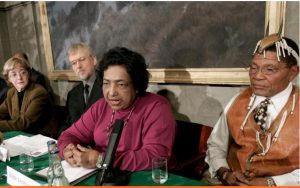…. HUMAN RIGHTS ….
An article by Mickey Spiegel for Human Rights Watch
It’s now a quarter of a century since Tenaganita, a civil society pioneer in the fight for women workers’ rights in Malaysia, was founded. It has thrived despite persistent government harassment and roadblocks to its work. But one look at its determined and principled leadership explains a lot.

Irene Fernandez speaks at the presentation of the winners of the Right Livelihood Awards in Stockholm, Sweden on December 7, 2005. © 2005 Reuters
Click on photo to enlarge
Since Tenaganita has never blown its own horn, too few people know of the group’s ground-breaking struggles for decent working conditions for both Malaysian and migrant women – be they on remote palm oil plantations, crowded factory assembly lines, or isolated in private homes as abused migrant domestic workers. Since 1991, Tenaganita has been instrumental in fighting for justice for women and men trafficked into forced labor and sexual exploitation in Malaysia; for urban refugees seeking the right to work and for their children’s right to schooling; and fighting for a bigger vision – that all ASEAN countries make their laws and practices conform with international rights standards.
(Article continued in the right column)
The right to form and join trade unions, Is it being respected?
(Article continued from the left column)
I and other Human Right Watch staff members learned much from Tenaganita about finding possible solutions for women workers’ struggles. The first lesson came from visiting its modest offices, jammed each day with clients patiently waiting their turn for help, and watching the staff never hurry a person in distress, no matter how late the hour or how difficult their case. The combination of modesty and principled persistence won through.
A second lesson came from the exceptional women who formed and led Tenaganita. The inimitable founder, Irene Fernandez, faced down repeated government threats to her work and her freedom in a trial and appeal that lasted 13 years. The authorities charged her for “maliciously publishing false news” after Tenaganita issued a report about the abysmal conditions in Malaysia’s immigration detention centers. After a seven-year-long trial, she was found guilty in 2003 – a conviction that hung over her head until the High Court overturned the verdict in 2008.
I’m forever grateful to Irene, who passed away in 2014, for the advice she gave me on migrant issues; to her sister Aegile Fernandez, part of the leadership team since the beginning; and to Glorene Das, now executive director. Glorene, dynamic yet modest, is never too busy to explain a new convoluted government program, or to rally activists when it is apparent that workers are in peril.
The hope, of course, is that someday workers will no longer need groups like Tenaganita. But it is a life saver for those in need. I am confident it will tackle challenges with the expertise, modesty, and tenaciousness that has been its trademark for 25 years.